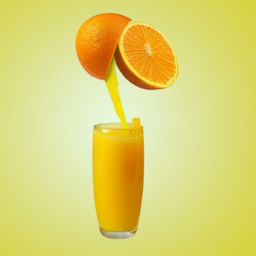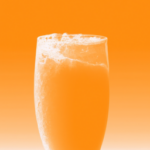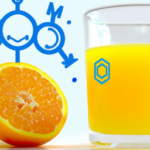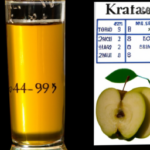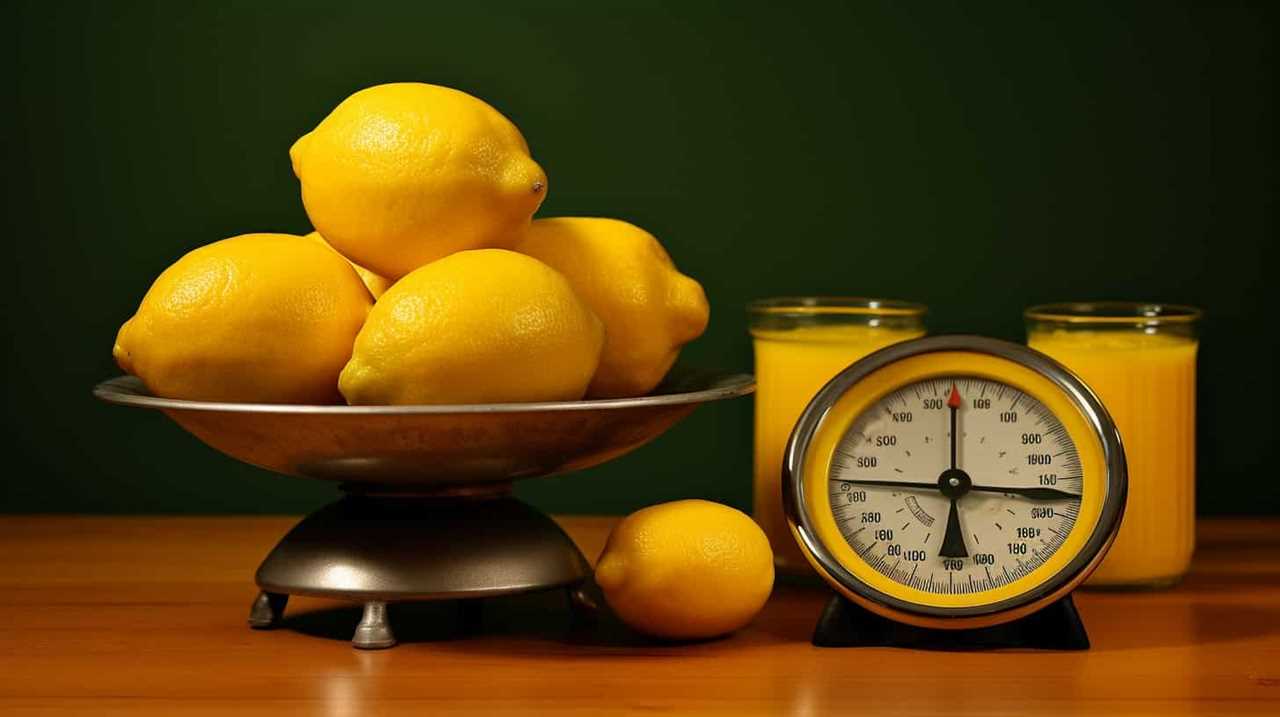Did you know that orange juice is not only known for being a great source of vitamin C but also a significant supplier of potassium? Discover more about this delicious beverage!
Potassium is an essential mineral that plays a crucial role in various bodily functions, from regulating blood pressure to maintaining fluid balance.
In this article, we’ll explore just how much potassium is in a glass of orange juice and why it’s important to incorporate this nutrient into our diets.
Orange juice is a popular beverage around the world, and for good reason. Aside from its delicious taste, it’s also a nutritious drink that can provide a range of health benefits.
One of the key nutrients found in orange juice is potassium, which is vital for maintaining good health. In the next section, we’ll delve deeper into why orange juice is such a good source of this essential mineral and how much potassium you can expect to find in a typical glass.
Key Takeaways
- One glass (8 ounces) of orange juice contains approximately 14% of the recommended daily intake of potassium for adults, which is 4,700 mg.
- Regular consumption of potassium-rich foods like orange juice can reduce the risk of stroke, kidney stones, and osteoporosis, and can help lower blood pressure levels.
- Other sources of potassium include fruits like bananas, avocados, and kiwis, vegetables like spinach, sweet potatoes, and tomatoes, and meats like salmon and chicken.
- It’s important to consult a healthcare professional before taking any supplements to increase potassium intake, as too much potassium can be harmful, especially for those with kidney problems.
Importance of Potassium in the Body
You may not realize it, but potassium plays a crucial role in maintaining proper bodily functions. It’s an essential mineral that helps regulate your heartbeat, supports muscle and nerve function, and maintains proper fluid balance. It also helps to lower blood pressure, reduce the risk of stroke, and prevent kidney stones.
In fact, a diet rich in potassium has been linked to numerous health benefits, including reduced risk of heart disease, osteoporosis, and stroke. The recommended intake of potassium for adults is 4,700 mg per day. Unfortunately, many people don’t consume enough potassium in their diets. This is especially true for those who consume a lot of processed foods, which are often high in sodium and low in potassium.
That’s why it’s important to include potassium-rich foods in your diet, such as fruits and vegetables. And one of the most popular sources of potassium is orange juice. Orange juice is not only delicious, but it’s also a great source of potassium. In fact, just one glass of orange juice (8 ounces) contains approximately 14% of the recommended daily intake of potassium. So if you’re looking to increase your potassium intake, consider drinking a glass of orange juice each day.
Why Orange Juice is a Popular Source of Potassium
Orange juice is basically a potassium powerhouse! It’s one of the most popular sources of potassium due to its high nutritional value and numerous health benefits. Here are three reasons why orange juice is a great way to boost your potassium intake:
-
Orange juice is rich in vitamins and minerals that promote overall health. It contains vitamin C, folate, and antioxidants that help protect cells from damage and reduce the risk of chronic diseases.
-
Drinking orange juice regularly can help lower blood pressure and reduce the risk of heart disease. Potassium plays a crucial role in regulating blood pressure by counteracting the harmful effects of sodium in the diet.
-
Orange juice is a convenient and delicious way to increase your potassium intake. It’s easy to find in grocery stores and can be consumed on its own or as a base for smoothies or other beverages.
With all these benefits, it’s no wonder that orange juice is a popular choice for those looking to increase their potassium intake. But how much potassium can you expect to get from a glass of orange juice? Let’s find out in the next section.
Potassium Content in a Glass of Orange Juice
Feeling low on energy and need a quick pick-me-up? Look no further than a refreshing glass of this citrusy beverage – it packs a powerful punch of a certain essential nutrient that your body craves! Orange juice is a great source of potassium, a mineral that plays a crucial role in maintaining healthy blood pressure, heart function, and nerve activity. In fact, a single 8-ounce serving of orange juice contains approximately 14% of the recommended daily intake of potassium for adults.
Potassium absorption from orange juice is also enhanced by its high content of vitamin C, which helps convert the mineral into a form that is easily absorbed by the body. Studies have shown that regular consumption of potassium-rich foods like orange juice can have significant health effects, such as reducing the risk of stroke, kidney stones, and osteoporosis. So next time you’re feeling sluggish, reach for a glass of orange juice to give your body the boost it needs!
Did you know that the recommended daily intake of potassium for adults is 2,500-3,000 mg? Now that you know how beneficial orange juice is for potassium absorption and overall health, stay tuned to learn more about how to meet your daily potassium needs.
How Much Potassium Do We Need Daily?
If you’re looking to maintain a healthy lifestyle, it’s important to consume the recommended daily intake of potassium, which is between 2,500-3,000 mg for adults. However, only 2% of Americans meet this requirement, which means that a large majority of people are not getting enough of this essential mineral.
Potassium is important for maintaining proper fluid balance, regulating blood pressure, and supporting healthy muscle and nerve function. Incorporating potassium-rich foods into our diets is an easy way to increase our daily intake of this vital nutrient.
Some examples of potassium-rich foods include bananas, sweet potatoes, spinach, avocado, and of course, orange juice. By following the daily potassium intake guidelines, we can help ensure that our bodies are functioning at their best and that we’re getting all the benefits of this important mineral.
So, let’s explore the benefits of incorporating potassium into our diets.
Benefits of Incorporating Potassium into Our Diets
Incorporating potassium-rich foods into our daily meals can have numerous benefits for our overall health and well-being. Potassium is an essential nutrient that plays a crucial role in maintaining healthy blood pressure and muscle function. Consuming foods that are rich in potassium can help to reduce the risk of hypertension and lower blood pressure levels. This is because potassium helps to counteract the negative effects of sodium, which can cause blood vessels to constrict and increase blood pressure.
In addition to its effects on blood pressure, potassium also plays a vital role in muscle function. Potassium is necessary for proper muscle contraction and relaxation, making it essential for physical activity and exercise. Adequate potassium intake can also help to prevent muscle cramps and spasms, which can be a common issue for athletes and individuals who engage in regular physical activity.
By incorporating potassium-rich foods into our diets, we can reap the numerous benefits that this essential nutrient has to offer. As important as it is to consume enough potassium, it’s also essential to be aware of the risks of potassium deficiency.
Risks of Potassium Deficiency
You’re seriously missing out if you don’t get enough of this essential mineral in your diet. Potassium is crucial for maintaining a healthy body and plays a vital role in several bodily functions. It helps regulate blood pressure, keeps your heart beating regularly, and aids in the proper functioning of muscles and nerves.
Unfortunately, many people fail to consume enough potassium, which can lead to several health problems. Symptoms of potassium deficiency include weakness, fatigue, muscle cramps, and irregular heartbeats. If left untreated, it can cause more severe conditions such as high blood pressure, kidney stones, and even heart disease.
To prevent potassium deficiency, it’s essential to incorporate potassium-rich foods in your diet, such as bananas, avocados, spinach, and, of course, orange juice. Treatment for potassium deficiency typically involves increasing potassium intake through diet or supplements. However, it’s crucial to consult a healthcare professional before taking any supplements.
Now, let’s talk about other sources of potassium that you can add to your diet.
Other Sources of Potassium
I’ve learned that potassium is an essential nutrient that my body needs to function properly, and now I’m curious about other sources of this mineral beyond orange juice.
Fortunately, there are a variety of foods that are rich in potassium. Fruits like bananas, avocados, and kiwis are great sources, as are vegetables like spinach, sweet potatoes, and tomatoes. Meats like salmon and chicken are also good options.
Remember to use contractions when appropriate.
Fruits
Fruits like oranges aren’t just tasty, they also provide essential nutrients like potassium that our bodies need.
When it comes to fruit juices, orange juice is one of the most popular options. Here are some facts about the potassium content in orange juice:
-
The potassium content in orange juice varies depending on the juice variety and brand. Some brands may add potassium to their juice, while others may not. When checking the label, it’s important to note how much potassium is in orange juice, as this can significantly differ between products. For those mindful of their potassium intake, this information can be crucial for managing dietary needs. On average, a cup of orange juice can contain anywhere from 400 to 500 milligrams of potassium, but it’s best to always verify the specific content on the packaging.
-
On average, an 8-ounce glass of orange juice contains around 450 milligrams of potassium.
-
This amount of potassium represents approximately 10% of the daily recommended intake for adults.
-
In comparison to other fruit juices, orange juice ranks high in terms of potassium content.
While fruits are a great source of potassium, vegetables also have high potassium content. Let’s explore some of the vegetables that are rich in potassium.
Vegetables
When it comes to getting our daily dose of nutrients, vegetables are a colorful and flavorful option that pack a punch. Not only do they provide essential vitamins and minerals, but they also contain fiber and antioxidants that are crucial for maintaining a healthy diet. One way to incorporate more vegetables into your diet is by trying vegetable smoothies. Blending together a variety of vegetables such as spinach, kale, and carrots with some fruits like bananas and berries can create a delicious and nutritious drink. These smoothies are a great way to start your day or to have as a mid-day snack.
Another great option for adding more nutrients to your diet is by snacking on potassium-rich vegetables. Potassium is an important mineral that helps regulate blood pressure, supports muscle and nerve function, and can even reduce the risk of kidney stones. Vegetables such as sweet potatoes, spinach, and broccoli are all excellent sources of potassium. You can enjoy them as a snack by roasting them with some olive oil and seasoning or by adding them to salads for an extra boost of nutrients.
Incorporating more vegetables into your diet can have numerous health benefits and is an easy way to improve your overall well-being.
As we move on to the next section about meats, it’s important to note that while meat can be a good source of protein, it’s also important to balance our diets with plant-based options.
Meats
If you’re looking to incorporate more protein into your diet, meats can be a great option. Meats are a rich source of protein, which is essential for building and repairing tissues in our bodies. They also contain other important micronutrients like iron, zinc, and vitamin B12.
However, it’s important to choose lean cuts of meat and to avoid processed meats, which are high in sodium and saturated fats. When it comes to nutritional benefits, different types of meats offer different advantages. For example, red meat is a good source of iron, while poultry is a good source of niacin.
Fish is a great source of omega-3 fatty acids, which have been shown to have numerous health benefits, including reducing inflammation and improving heart health. Incorporating a variety of meats in your diet can help ensure that you’re getting a range of essential nutrients.
As we move on to the next section about factors affecting potassium absorption, it’s important to note that some meats, like beef and pork, are also a good source of potassium. However, the amount of potassium in meats can vary depending on the cut and cooking method.
Factors Affecting Potassium Absorption
You can enhance the absorption of potassium by consuming foods that are rich in vitamins C and D. These vitamins help improve gut health, which in turn, leads to better absorption of nutrients, including potassium. Additionally, certain medications such as diuretics and laxatives may interfere with potassium absorption. Hence, it’s important to consult a healthcare professional and take necessary precautions to ensure optimal absorption.
Here are five factors that can influence potassium absorption, apart from gut health and medication interactions:
-
Age: As we age, our body’s ability to absorb potassium decreases. Hence, older adults may need to consume more potassium-rich foods to meet their daily requirements.
-
Exercise: Intense physical activity can lead to potassium loss through sweating. Hence, athletes and fitness enthusiasts need to replenish their potassium levels by consuming electrolyte-rich beverages and foods.
-
Potassium intake: The more potassium you consume, the less you absorb. Hence, it’s important to balance your potassium intake with your body’s needs.
-
Sodium intake: High sodium intake can lead to increased potassium excretion through urine. Hence, it’s crucial to maintain a balanced sodium-potassium ratio.
-
Vitamin B6: Vitamin B6 helps convert food into energy, which in turn, improves potassium absorption. Hence, consuming foods rich in vitamin B6 can enhance potassium absorption.
To increase your potassium intake, you can consume potassium-rich foods such as bananas, potatoes, spinach, and avocados. You can also opt for fortified foods such as orange juice, which typically contains around 450mg of potassium per 8-ounce serving. Additionally, incorporating electrolyte-rich beverages and snacks in your diet can help replenish your potassium levels.
How to Increase Potassium Intake
Boost your body’s electricity with potassium-rich foods and electrolyte-rich beverages, charging you up like a battery for optimal performance.
Potassium is an essential mineral that plays a crucial role in maintaining fluid balance, regulating blood pressure, and supporting proper muscle and nerve function.
If you’re looking to increase your potassium intake, there are several potassium-rich foods you can add to your diet. Some examples include bananas, sweet potatoes, spinach, avocados, and white beans. Incorporating these foods into your meals can help you meet your daily potassium needs.
In addition to potassium-rich foods, you can also consider taking potassium supplements. However, it’s essential to speak with your healthcare provider before starting any new supplements, as taking too much potassium can be harmful, especially if you have kidney problems.
If you’re looking for a natural way to increase your potassium intake, incorporating potassium-rich foods into your diet is a safe and effective option. Remember to aim for at least 3,500 milligrams of potassium per day to support optimal health.
Frequently Asked Questions
Can consuming too much potassium be harmful?
Yes, consuming too much potassium can be harmful and lead to Potassium toxicity. The recommended daily intake for adults is 2,500-3,000 mg. It is important to monitor your intake and consult a medical professional if necessary.
Is there a difference in potassium content between freshly squeezed orange juice and store-bought orange juice?
I found that freshly squeezed orange juice has slightly more potassium than store-bought. Potassium helps regulate blood pressure and supports heart health. Drinking orange juice can be a delicious way to boost your potassium intake.
Can people with kidney problems consume orange juice for its potassium content?
As someone with impaired kidney function, I’m cautious about my potassium intake. While orange juice is high in potassium, it’s still possible to enjoy it in moderation while adhering to dietary restrictions. Consult with a healthcare provider for personalized advice.
Are there any medications that can interact with potassium in orange juice?
As a medical professional, I advise caution when consuming orange juice with medication due to potential drug interactions. Absorption factors and individual medication requirements should be considered. Consult with your healthcare provider for personalized advice.
Can orange juice be used as a substitute for potassium supplements?
As the saying goes, "An apple a day keeps the doctor away,"but what about orange juice? While it does contain potassium and other nutrients, it’s not a substitute for supplements. However, consuming potassium-rich foods like orange juice can help maintain healthy blood pressure.
Conclusion
Wow, who knew that a simple glass of orange juice could pack such a powerful punch of potassium? After learning about the importance of potassium in the body and the benefits of incorporating it into our diets, I’m convinced that I need to start drinking more orange juice.
I mean, just one glass can provide almost 10% of my daily potassium needs! But don’t just stop at orange juice – there are plenty of other sources of potassium out there to explore.
And with the risks of potassium deficiency being so serious, it’s important to make sure we’re getting enough of this vital nutrient. So let’s all raise a glass of orange juice (or maybe a banana smoothie, or a baked potato) to our health and happiness, and keep that potassium flowing!
Cindy thoroughly researches juicing trends, techniques, and recipes to provide readers with practical advice and inspiration. Her writing style is accessible, engaging, and designed to make complex concepts easy to understand. Cindy’s dedication to promoting the advantages of juicing shines through her work, empowering readers to make positive changes in their lives through the simple act of juicing.

